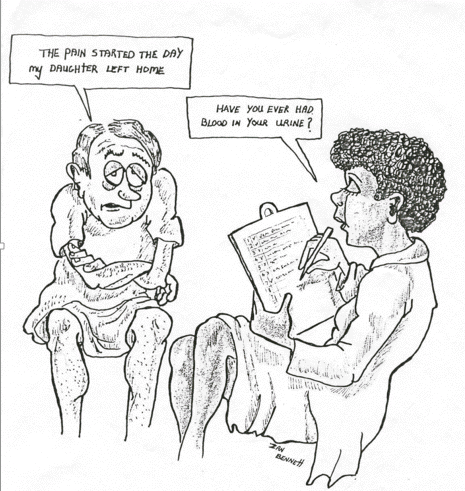
An issue that often crops up is the question of whether treatment would be safer if given by specialists (partialists) rather than general practitioners (generalists). We wouldn’t have the problems with antidepressants and antipsychotics, for instance, many people seem to think, if prescribing was done by psychiatrists rather than GPs.
This could not be more wrong. There might at one point have been ways in which some partialists were better at making diagnoses than generalists – in dermatology, for instance, where clinical practice involves looking and touching and comparing this case to the last one. But in most other areas of medicine, nobody looks or listens anymore, least of all in psychiatry. People increasingly ask the questions on a rating scale or that present on an Electronic Medical Record (EMR), so much so that doctors are being replaced by nurses or pharmacists and all could soon be replaced by robots, and your problem on treatment likely doesn’t feature among the questions on the rating scale or programmed into the EMR.
This could not be more wrong. There might at one point have been ways in which some partialists were better at making diagnoses than generalists – in dermatology, for instance, where clinical practice involves looking and touching and comparing this case to the last one. But in most other areas of medicine, nobody looks or listens anymore, least of all in psychiatry. People increasingly ask the questions on a rating scale or that present on an Electronic Medical Record (EMR), so much so that doctors are being replaced by nurses or pharmacists and all could soon be replaced by robots, and your problem on treatment likely doesn’t feature among the questions on the rating scale or programmed into the EMR.

Of if it does feature, perhaps you mention homicidal ideation; ticking the box is likely to lead to you being detained rather than any questioning of whether the management in the health service, or wherever you work, is vindictive and bullying, as a BBC program on whistle blowing in the NHS recently suggested, in which case it might be more appropriate to detain the management. Ticking, in this case, and pretty well all cases, literally puts you in a box.
But even if dermatologists look at you and perhaps touch you, they rarely listen to you, and when it comes to treatment they are as much boxologists as any other partialists. They put you on Ro-Accutane and doxycycline, and have begun to use Otezla and other new PDE-4 antagonists, and simply don’t hear you when you tell them you’ve become agitated or suicidal or you can no longer function sexually.
The only hope for medicine lies with generalists. They are still much more likely to see you when you walk into their office and notice differences from one visit to the next. Faced with the consequences of a bunch of partialists piling drug on top of drug so that people end up on 10 or 20 drugs per day, generalists are leading the push to de-prescribe. They have been the first doctors to rebel against guidelines, rating scales and EMRs.
So what goes wrong when a generalist gives drugs like antidepressants, Ro-Accutane or asthma drugs like Singulair and Accolate? The problem is they are likely to have been “educated” by a partialist, who you might expect to know the truth about a new drug, but who in fact is speaking from a text prepared for them by some pharmaceutical company, or have their names on an article written for them by pharma.
The image above is of a goat leading sheep. This is a recognized ph/farming maneuver. The sheep dutifully follow – to the slaughter house. If you google under the term Judas Goat, you can see many more images, some of them distressing. The Judas Goat gets his reward afterward.
The Judas idea applies well in this case, except those who end up slaughtered are those of us with skin or other problems – not the generalists who may have ended up doing the prescribing on the recommendations of a boxologist.
Campaigning to have us all seen by the right partialist, such as a shrink, in the case of an antidepressant, hoping this will lead to a better outcome is exactly the wrong answer to the problems we now have. If there were a choice between getting rid of partialists or generalists, at the very least the Goats would have to go, and if that didn’t solve the problem, the partialists should be taken out, sparing only those who show some evidence of realizing their role is a semi-robotic one delegated to them by the generalist looking after the patient’s overall management.















Thanks David.
Obviously modern medicine is a drug selling business (and a business for selling medical machines and medical education). Not to mention a huge employer. This is a dangerous combo we face, especially since most of us believe that our health is not primarily our own responsiblity and that science wants to save us.
Report comment
Spot-on post by Healy and also comment by @anothervoice.
The comparison to dermatology is apt as well (any medical specialty would have been, sadly), as I learned. When one of my children had a sudden, extreme flare of eczema I knew that the only thing at the dermatologists’ disposal was steroidal cream, which suppresses immune function and creates serious side effects. It’s all they know, and their science is 17 years old (google the statistic: all info at the average MD’s disposal is 17 years old at any given moment).
We researched through the information from Integrative and Functional science and medicine and cleared the eczema through radical change in diet and attitude, plus supplementation (vitamins, herbs, natural oils). They call it ‘root cause resolution’.
Similarly, if I had run for the advice of dumb MDs when my other child demonstrated serious behavioural issues, we would have been prescribed one or more harmful drugs (by either a partialist or generalist) that treat and heal nothing. We chose an alternate route and are happy we did. A difficult, complex, and long-term project? Yes. People need to stop abdicating responsibility for their health to these experts goats or nothing will change.
Liz Sydney
Report comment
Liz,
You sure you aren’t thinking of oral steroids? I haven’t seen anything that says steroid cream suppresses immune function.
On a related note, my PCP gave me some steroid cream for a rash on my leg which did absolutely nothing. Increasing my vitamin C dose got rid of it which was totally unexpected. 🙂
Report comment
Hi @AA, Here’s a link I’ve plucked at random:
https://nationaleczema.org/eczema/treatment/topical-corticosteroids/
The only system conventional dermatology has for ‘treating’ skin issues is to ‘clear’ it cosmetically: scalpel or pharma. Can’t ‘remove’ eczema, so the only way to ‘clear’ it is to stop the immune system from overreacting in its cell production, ie suppress its function in that area. Topical or oral: same target, which is to stop the immune system from running in high gear. But the pharma carries terrible side effects, doesn’t address why the immune system is overreacting, or help it stop.
Yes, good vitamin C was in our arsenal. Vitamin C has amazing efficacy, but conventional MDs will never prescribe it. Your MD-prescribed steroid might have been too low-dose to clear the eczema before you ran out of patience. There are lots of doses since they prescribe it to newborns, believe it or not (instead of addressing underlying gut issues). Good for you for getting off of it.
Report comment
At least where I work, the psychiatrists still have more time than the generalists so they do have an opportunity to listen. In addition, it is only the psychiatrists – some but not all – who are actually reading the literature about the medications and have a more jaundiced view. The generalists need to know so much and it is much harder to “bend the curve” in their practicing style. I recently had a PCP resume care of a mutual patient because she did not think I was being aggressive enough with medications and she did not believe my opinion regarding their lack of efficacy. She was of the opinion that she would rather “do something” than do nothing. This is for me a more fundamental issue. Doctors want to be helpful and giving a pill feels more helpful than simple listening.
Report comment
At least where I work, the psychiatrists still have more time than the generalists so they do have an opportunity to listen. In addition, it is only the psychiatrists – some but not all – who are actually reading the literature about the medications and have a more jaundiced view. The generalists need to know so much and it is much harder to “bend the curve” in their practicing style. I recently had a PCP resume care of a mutual patient because she did not think I was being aggressive enough with medications and she did not believe my opinion regarding their lack of efficacy. She was of the opinion that she would rather “do something” than do nothing. This is for me a more fundamental issue. Doctors want to be helpfuland giving a pill feels more helpfu
Than simple listening.
Report comment
That’s interesting Sandra! My recent experience as a patient has been just the opposite. Psychiatrists seem controlled by the old axiom that when you are a hammer specialist, everything looks like a nail. Any worsening, or failure to improve, on a psychiatric drug is met with an increasingly complex and potentially disabling “cocktail.” To cite just one example: a big reason for the increasing use of amphetamines (Adderall etc) in adults is not “Adult ADHD” at all. Rather, they are being prescribed to overcome the effects of other meds that have left patients increasingly sedated, obese, apathetic and generally miserable. (Sometimes, I’ll bet, this is coded as “comorbid ADHD” simply so the insurance company will pay.) They then have to add Xanax for the anxiety and/or Ambien for the insomnia triggered by the amphetamines. This chasing of one drug with another is going on in pain clinics with the opioids as well as in psychiatry with the antipsychotics and anticonvulsants.
The only person I could get to acknowledge this problem, in my own case, was my GP. And part of her willingness to question came from what she saw among members of her own family who were under psychiatric “care” including two young adults who were clearly dependent on their prescribed Adderall. Lately I have met a few more GPs who confess to being increasingly aghast at what they see in their patients who have been referred to psychiatry.
I think your clinic may be a real standout, and possibly a vanishing breed (I hope not!) But more and more the “care model” for the so-called seriously mentally ill involves a psychiatrist who sees them once or even not at all — instead the doctor supervises a psych nurse practitioner who sees the patient for fifteen minutes every two months and prescribes according to an algorithm she’s been given by the folks who never, ever see the patient. Hopefully there is someone who talks to the patient, and even listens — but that person is now two or three steps removed from the one making the prescribing decisions.
This is the model I uncovered in the very best, most “progressive”agency in Chicago while trying to find help for a workers comp client who had been judged to have “paranoid schizophrenia.” Lord only knows what’s going on in the second- and third-rate institutions.
Report comment
Classifying patients into slots and then drugging them according to instructions somehow seemed scientific. But it is dehumanizing and is causing the epidemic of mental illness that we see on our streets, hear about in our prisons and in our media. In Ontario they paid me to talk with people and I discovered that even those with longstanding psychoses could become well when they pursued the origins of their disorders with me.
A simple human approach, perhaps like Pinel used….
Report comment